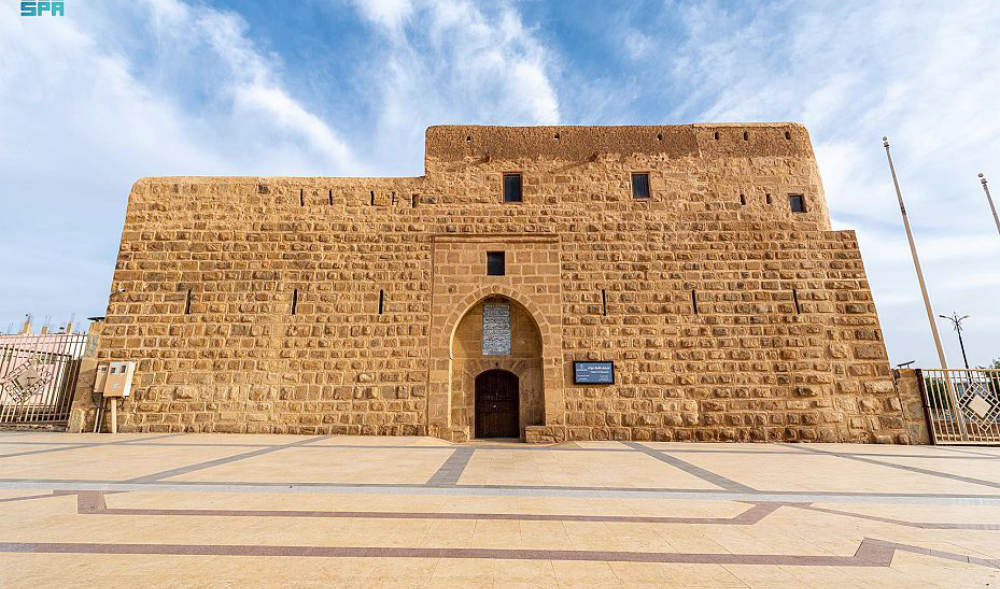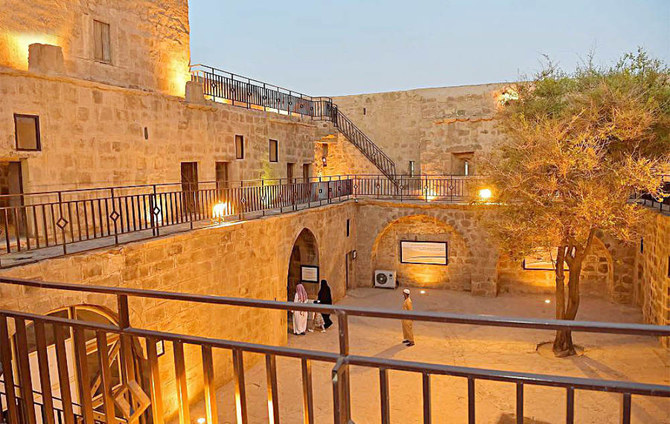Tabuk Castle stands tall as one of the region’s most important historical monuments as its location has links with the site where Prophet Muhammad lived during the Battle of Tabuk.
The ancient fortress is one of the stations on the Shami Hajj Road, which connects the Levant and Madinah. The road has castles and stations starting from the borders of Jordan to Madinah.
The castle’s construction dates back to 1586. It was restored in 1653 and then renovated and restored again in 1843. The mosque’s mihrab bears an inscription to mark the occasion.
The castle was renovated again in 1950 and in 1992 by the Agency for Antiquities and Museums in the former Ministry of Education.
The General Authority for Tourism and National Heritage played an important role in refurbishing the castle in 2012, and the building is now an archaeological museum with many artifacts and heritage items on display.
It is open to visitors throughout the week.
The castle has two floors, with the ground floor comprising an open courtyard, rooms, a mosque, and a well.
The upper floor has an open-air summer mosque and rooms, in addition to other stairs that lead to the towers used for guarding and observation. Behind the castle, there are the royal pools. One is square and the other is rectangular.
The Tabuk region has monuments, landmarks, castles, and palaces that reflect the depth of the historical eras and civilizations present in the region, which has a legacy spanning thousands of years.
Its geographical location was pivotal for trade routes throughout history.
ThePlace: Tabuk Archaeological Castle, an ancient fortress on the Levant-Madinah Hajj road
https://arab.news/z52cm
ThePlace: Tabuk Archaeological Castle, an ancient fortress on the Levant-Madinah Hajj road

- The castle was renovated again in 1950 and in 1992 by the Agency for Antiquities and Museums in the former Ministry of Education
Saudi, Hungarian officials discuss parliamentary ties

RIYADH: A Shoura Council delegation from the Saudi-Hungarian Parliamentary Friendship Committee concluded their official visit to Hungary, the Saudi Press Agency reported on Saturday.
They met with the National Assembly speaker Laszlo Kover and members of the Hungarian counterpart committee to enhance parliamentary cooperation and strengthen ties between the two countries.
During the visit, the delegation met Hungarian Deputy Minister of Foreign Affairs and Trade Magyar Levente, Minister of State for Water and Irrigation Zsolt Nemeth, officials from the Hungarian Ministry of Energy, and Saudi-Hungarian Business Council Co-chair Peter Karpati.
Hungarian officials stressed the importance of bilateral relations and appreciated the Kingdom's pioneering role. They also discussed ways to boost cooperation across various fields.
The delegation included committee chairman Ibrahim Al-Qannas and members Zaher Al-Shehri, Salem Al-Jarbou, Aisha Arishi, Abdulaziz Al-Jaloud, Fares Al-Osaimi, and Hisham Al-Faris. Saudi Ambassador to Hungary Majed Al-Abdan also attended the meetings.
$38m Saudi loan to boost Tunisia’s southern regions

- Saudi Fund for Development CEO, Tunisian prime minister discuss expanding bilateral cooperation
Riyadh: Saudi Fund for Development CEO Sultan Al-Marshad signed a new development loan agreement with Tunisian Minister of Economy and Planning Samir Abdelhafidh to finance the Oasis Hub Project in southern Tunisia.
The loan, exceeding $38 million, was signed in the presence of Saudi Ambassador to Tunisia Abdulaziz Al-Saqr. The agreement reflects a strong development partnership spanning nearly 50 years, the Saudi Press Agency reported.
The Oasis Hub Project aims to support sustainable rural development by reclaiming more than 1,000 hectares of agricultural land across various Tunisian regions. It includes drilling and equipping 22 wells, expanding rural villages and infrastructure, and building more than 285 housing units for local residents.
The agreement is part of the Saudi fund’s ongoing efforts to promote sustainable development in Tunisia by financing infrastructure that improves living standards, creates jobs, and supports the Sustainable Development Goals.
The project will enhance regional infrastructure through the construction of roads, pipelines, and water networks for drinking and irrigation. It will also support educational institutions, agricultural facilities, and cultural, social, and commercial centers.
These efforts aim to improve quality of life and drive economic and social growth in Tunisia’s southern governorates, the SPA reported.
Since beginning operations in Tunisia in 1975, the Saudi fund has financed 32 development projects and programs through concessional loans totaling more than $1.2 billion, along with grants exceeding $105 million.
On the sidelines of the signing, Al-Marshad met with Tunisian Prime Minister Sarra Zaafrani Zenzri in Tunis, joined by Abdelhafidh, Al-Saqr, and other officials.
The meeting explored ways to strengthen development cooperation and highlighted the decades-long partnership, especially in financing key projects in Tunisia.
Al-Marshad also met with Tunisian Minister of Health Dr. Mustapha Ferjani to discuss ongoing health projects funded by the Saudi fund and potential support for the Tunisian health sector.
Beit Hail Festival showcases regional heritage, attracts tourists

RIYADH: Now in its fourth year, the Beit Hail Festival has established itself as a prominent cultural, tourism, and entertainment event, attracting many visitors to the region.
The festival showcases traditional handicrafts that reflect Hail’s historical roots and offers interactive activities and performances, the Saudi Press Agency reported on Friday.
These elements celebrate the region’s heritage and community identity while blending tradition with modern touches, the SPA reported.
Held under the patronage of the Hail governor and supported by his deputy, the two-week festival aims to highlight local folkloric heritage and strengthen national identity.
It includes artistic performances, traditional crafts, authentic foods, and tourism-focused events aligned with Vision 2030 goals.
Over the past three editions, the festival has drawn steady attendance from local and international visitors, especially during summer holidays.
Visitors appreciate the diverse pavilions, cultural displays, performances, and art exhibitions, according to the report.
The festival also helps promote community participation and support the local economy by offering opportunities and events for productive families and small businesses.
Samia Suleiman Al-Jabri, associate professor of modern history at Hail University, said handicrafts remain a vital part of Hail’s heritage, preserving ancient traditions through crafts such as sadu weaving, pottery, wickerwork, and other arts rooted in Bedouin culture.
Al-Jabri added that over its three editions, the festival has organized events and launched numerous initiatives and workshops to document and safeguard traditional crafts, teach them to younger generations, and connect artisans directly with the public.
Kingdom arrests 13,532 illegals in one week

Riyadh: Saudi authorities arrested 13,532 people in one week for breaching residency, work and border security regulations, the Saudi Press Agency reported on Saturday.
A total of 7,903 people were arrested for violations of residency laws, while 3,744 were held over illegal border crossing attempts, and a further 1,885 for labor-related issues.
The report showed that among the 1,892 people arrested for trying to enter the Kingdom illegally, 67 percent were Ethiopian, 31 percent Yemeni, and 2 percent were of other nationalities.
A further 34 people were caught trying to cross into neighboring countries, and 17 were held for involvement in transporting and harboring violators, the SPA reported.
The Ministry of Interior said that anyone found to be facilitating illegal entry to the Kingdom, including providing transportation and shelter, could face imprisonment for a maximum of 15 years, a fine of up to SR1 million ($267,000), as well as confiscation of vehicles and property.
Suspected violations can be reported on the toll-free number 911 in the Makkah and Riyadh regions, and 999 or 996 in other regions of the Kingdom.
Islamic coalition concludes imam training in Comoros

RIYADH: The Islamic Military Counter Terrorism Coalition recently concluded its “Building Capacity for Imams and Preachers” training program in Moroni, Comoros, the Saudi Press Agency reported on Saturday.
The five-day program gave imams and preachers intensive training on topics including deconstructing extremist rhetoric, social influence techniques, public speaking, and promoting moderacy.
Comoran Minister of Justice and Islamic Affairs Anfani Hamada Baca thanked the Saudi-backed coalition for its "significant efforts to counter extremist ideas and promote moderacy through various strategic initiatives aimed at combating extremism and terrorism.”
Participants praised the program’s organization and scientific content, stressing the importance of expanding such initiatives to strengthen educational and religious institutions in protecting communities from extremist ideology, the SPA reported.
Earlier, Comoros Defense Minister Youssoufa Mohamed Ali reaffirmed his country’s commitment to the coalition’s fight against extremism and terrorism, adding that the program’s launch was a “significant step forward” in that fight.
Maj. Gen. Mohammed Al-Moghedi, the coalition’s secretary-general from Saudi Arabia, said the initiative was part of a broader effort involving 15 strategic programs in four areas: intellectual development, media, counter-terrorism financing, and military operations.


















